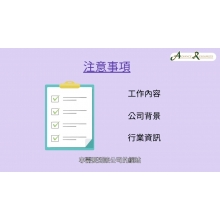Blog
職場資訊

求職面試小錦囊 Part 3 面試模式 (Interview mode)
面試模式
面試模式可以分為三種。第一種是最傳統的,親身到僱主的公司面見。第二種是電話,僱主對求職者做一個初步的了解。第三種亦是現時很常用的網上面試模式,比較常用的軟件有Microsoft Teams和Zoom。
點擊播放影片
YouTube:https://youtu.be/w_AHz0W5ClY
職場資訊

求職面試小錦囊 Part 2 面試常見問題 (Interview common questions)
面試常見問題
面試的題目可以分為我、你、他。我是求職者本人,經常是自我介紹。你是面試的公司,指對公司的行業、公司背景及工作內容的理解和認識。他是其他類型問題,包括假設性問題、處境式問題和深入的問題。
點擊播放影片
YouTube:https://youtu.be/U2ODPz3fyXw
職場資訊

求職面試小錦囊 Part 1 面試前準備 (Interview preparation)
面試前準備
當收到面試資料和工作內容,我們要好好準備面試。面試前準備包括記熟工作內容的重點、解公司背景和行業資訊、預計可能會遇到的面試問題、計劃回應的方式和內容和練習面試的具體情況。
點擊播放影片
YouTube:https://youtu.be/UDRFyFVmAa8
職場資訊

Common Interview Questions
When preparing for the interview, you should consider the frequently asked questions in interviews. Questions include personal background and information, understanding of industry, company and position, work motivation and ambitions, job-related skills and knowledge and situational issues.
14 Common interview questions
1. Please introduce yourself.
The information you provide should be job relevant.
2. What are your strengths?
Focus on skills and experience which are relevant to the job.
3. What is your weakness?
Choose the easier way by mentioning just one or two weaknesses that have little adverse effect on the job you apply for and have no relevance to the requirements for the post.
Talk from a positive angle when telling your weaknesses.
4. What are your hobbies and interests during leisure time?
Focus on those hobbies and interests that are related to the job.
Draw the attention of interviewers to your strengths and achievements.
5. Please tell us your work experience.
Give examples to explain your job duties and support the achievements and experience you have attained.
Talk about the training you have received and skills acquired, and relate them to the job you apply for (if you don’t have any work experience).
6. Why do you apply for this job?
Explain the reasons why you are interested in the job, why you like to join the company and the trade.
Possessing the qualifications for the job should be a possible reason why you apply for the job.
Explain how the post and company suit your interests, your expectation and opportunity for further development.
7. What do you know about our company? Why do you want to join our company?
Tell what you know about the company and the industry to show your interest and your enthusiasm.
Collect and study information related to the company before the interview.
8. Are you willing to work shift/overtime or travel to and from the Mainland?
Give a reply based on your actual situation, but don’t be preoccupied with your gains and losses.
Indicate your willingness under reasonable circumstances unless you have practical difficulties.
9. Why do you want to quit your previous job? Why do you change your job frequently?
Speak out frankly if you have any objective reasons to change jobs, such as closing down of the company.
Don’t tell lies.
Give positive reasons.
Further development is a good reason for resignation, such as exploring opportunities for career development and learning new working experience and skills.
Emphasize how the experience and knowledge gained from the change of jobs are relevant to the job you are applying for.
Don’t criticize your former employers and colleagues when giving reasons for change of employment.
Don’t show your dissatisfaction on the need to work overtime and the posting arrangements for previous jobs.
10. Do you have any plan to pursue further studies in the near future?
Briefly describe your study plan, in particular those plans related to the post you apply for.
Stress that you are willing to pursue study in courses that are relevant to the post you are applying for.
Don’t exaggerate.
Don’t tell lies.
11. Hypothetical questions:How would you handle a customer who makes trouble out of nothing? How would you handle conflicts between you and your boss/colleagues?
Test your ability to respond to changes.
Relate to the real working environment.
Try to answer these questions by using professional skills and common sense gained from your past working experience.
12. Questions on current affairs, e.g. hot social topics, government policies, etc.
Let interviewers know your viewpoints.
Be rational and objective when expressing your views.
Don’t argue if the interviewers don’t agree with you.
Discuss the issue with them calmly.
13. What is your expected salary?
State your expected salary if you have conducted a research on the salary trend in the market.
Be flexible in negotiating with your potential employer by taking into account other factors like employee’s benefit, annual leave, training and promotion prospects.
14. Do you have any questions to ask?
Grasp the chance to ask some questions which are related to the company and the post.
Show your interest and sincerity for the job. Avoid asking questions on employee’s benefit.
Source: Labour Department (https://www2.jobs.gov.hk/1/0/WebForm/information/en/ig/jh_bc/page2.aspx)


